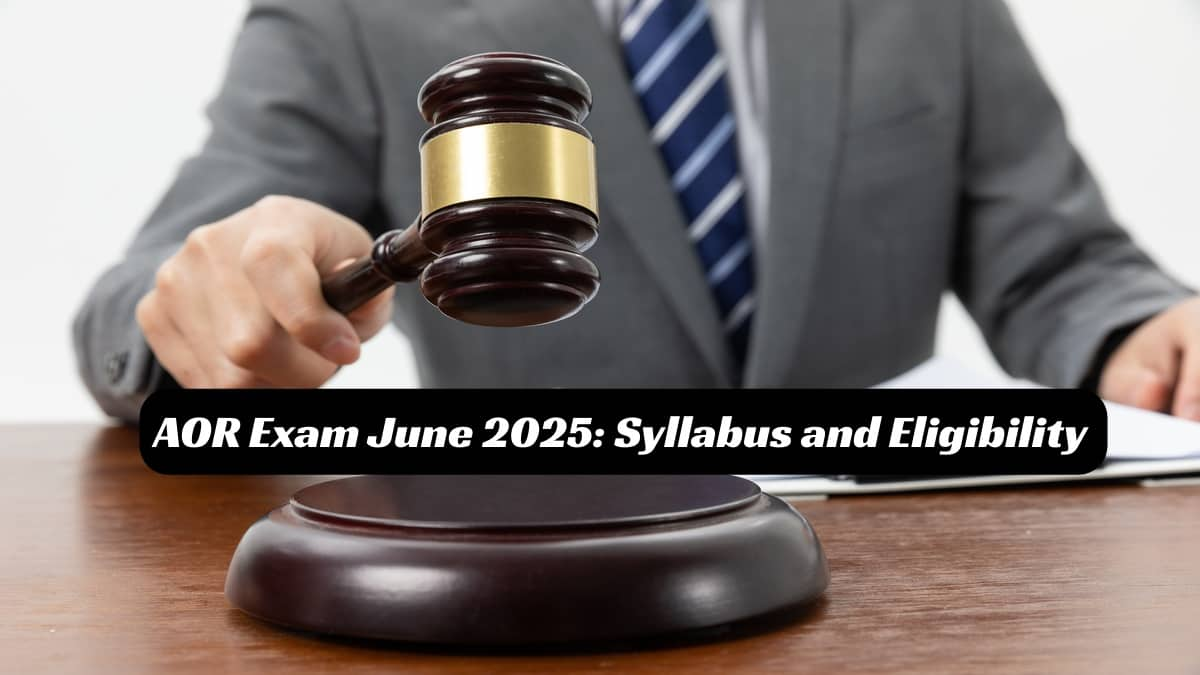Manav Rachna University Law Admissions 2026
Admissions open for B.A. LL.B. (Hons.), B.B.A. LL.B. (Hons.) and LL.B Program (3 Years) | School of Law, MRU ranked No. 1 in Law Schools of Excellence in India by GHRDC (2023)
The Supreme Court of India has notified the dates for the Advocates-on-Record exam to be conducted in June 2025. The AOR June 2025 exam will be conducted across four days on June 16, 17, 20, and 21 in offline mode. Candidates who clear the AOR June 2025 will be able to practise law at the Supreme Court of India. In this article, get the eligibility criteria for the AOR exam and complete syllabus details.

The AOR application form for June 2025 will be open from April 15 to 30. Candidates can submit a physical copy of the duly filled-in application form to the AOR Examination Cell at the SC. The application form can be obtained from the AOR examination cell or can be downloaded from the official website.
The Supreme Court has prescribed the AOR exam eligibility criteria in the exam notification. Before filling up the AOR June 2025 application form, candidates must make sure they fulfil the AOR eligibility criteria. The details are given below.
Advocates who have completed their training for a continuous period of one year starting from the end of the fourth year of the date of their enrolment ending with the 30th April 2025, or would complete their training before the commencement of the AOR exam are eligible to appear for the AOR June 2025 exam.
Admissions open for B.A. LL.B. (Hons.), B.B.A. LL.B. (Hons.) and LL.B Program (3 Years) | School of Law, MRU ranked No. 1 in Law Schools of Excellence in India by GHRDC (2023)
Last Date to Apply: 10th February 2026 | Grade 'A+' accredited by NAAC | Ranked 33rd by NIRF 2025
Candidate’s application will be accepted only upon production of certificate of completion of training from an Adovate-on-Record under Regulation 6 of the AOR exam regulations.
Candidates can appear for the AOR exam a maximum of five times only.
Candidates who have failed in all papers in the previous AOR exam will not be allowed to appear for the next AOR exam
Candidates who did not appear for a particular paper and failed in any of the papers in which they appeared will be considered to have failed in all the papers. Such candidates are not allowed to appear for the next AOR exam.
If a candidate has been absent from appearing at an earlier AOR exam after receiving the roll no, then they will not be allowed to appear for a subsequent AOR exam without good reason and express permission of the Board of Examiners
The AOR June 2025 exam syllabus consists of four papers. Each paper will be worth 100 marks. The papers are descriptive, and candidates will get three hours to attempt the papers. The paper-wise details of the AOR Exam syllabus are given below.
Paper | Paper name | Topics |
Paper 1 | Practice and procedure of Supreme Court |
|
Paper 2 | Drafting |
|
Paper 3 | Professional ethics |
|
Paper 4 | Leading cases |
|
To clear the AOR June 2025 result, candidates must obtain atleat 50% marks in each of the papers and overall aggregate marks of 60% in the exam.
If a candidate obtains 60% aggregate and but fails to obtain 50% in one of the papers then the candidate will be allowed to appear for the next exam only in that particular paper in which the candidate obtained less than 50%. Subsequently, if the candidate obtains more than 50% in the paper for which they reappeared, then they will be considered to have passed the AOR exam.
If a candidate obtains more than 50% in all the papers but fails to obtain 60% aggregate then they will be allowed to appear in any one paper in the next attempt and will be considered to have cleared te AOR exam if the marks obtained in that paper together with the remaining papers is more than 60% in aggregate.
Ranked #1 Law School in India & South Asia by QS- World University Rankings | Merit cum means scholarships | Early Admissions (Pahse 2) Deadline: 28th Feb’26
India's Largest University | BCI approved | Meritorious Scholarships up to 5 lacs |
Among top 100 Universities Globally in the Times Higher Education (THE) Interdisciplinary Science Rankings 2026
Excellent curriculum; an impressive range of electives, besides core law courses. Up to 100% merit scholarship on a first-come, first-served basis
Last Date to Apply: 25th Feb | Ranked #18 amongst Institutions in India by NIRF | Ranked #1 in India for Academic Reputation by QS Rankings | 16 LPA Highest CTC
#14 in India by NIRF Ranking | NAAC A++ accredited | Approved by BCI | Scholarships Available
Admissions open for B.A.LL.B.(Hons.) & B.B.A.LL.B (Hons.) via NLAT @ NMIMS University
North India's Largest Educational Group | NIRF Ranked 87 | NAAC A+ Grade | Highest Package 1.6 Cr